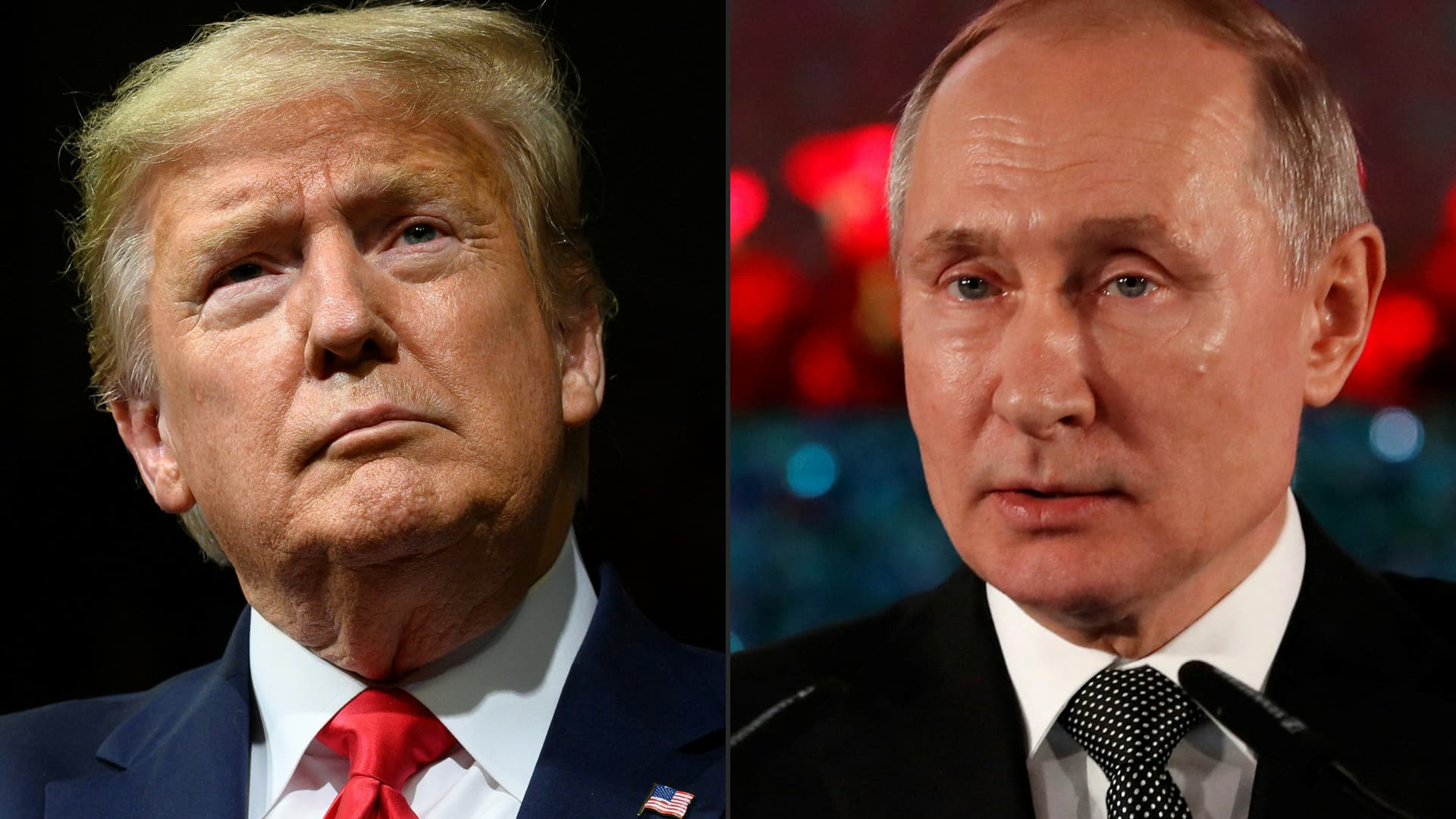(COMBO) This combination of pictures created on February 21, 2020 shows
US President Donald Trump delivers remarks at a Keep America Great rally in Phoenix, Arizona, on February 19, 2020.
Russian President Vladimir Putin delivers a speech during a ceremony in Jerusalem on January 23, 2020 commemorating the people of Leningrad during the Second World War Nazi siege on the city.
Jim Watson | Afp | Getty Images
U.S. President Donald Trump will approach his encounter with Kremlin leader Vladimir Putin as a “listening exercise,” the White House said, taming expectations that this week’s Alaska summit could yield a deal to end Russia’s invasion of Ukraine.
“This is a listening exercise for the president. Look, only one party that’s involved in this war is going to be present,” White House Spokesperson Karoline Leavitt said Tuesday. “And so this is for the president to go and, again, to get a more firm and better understanding of how we can hopefully bring this war to an end.”
The shift to downplaying the Friday meeting between the two heads of state — which will take place at the Joint Base Elmendorf-Richardson in Anchorage, Alaska, according to NBC News reporting — takes place as Russia has deepened its advance in eastern Ukraine, in a likely bid for battlefield leverage ahead of negotiations. Moscow has persisted on a set of maximalist conditions to cease the devastating war in Ukraine, including the retainment of occupied territories, Kyiv’s renunciation of its ambitions to join the NATO alliance and fresh elections in the invaded country.
Concerns have been growing in Kyiv and among its European allies that an increasingly frustrated Trump, who has criticized both Russia and Ukraine over the course of the U.S.-brokered discussions, could push through peace at the price of territorial concessions.
Trump on Monday circulated the notion of “land swapping” between the parties at war, although it remains unclear what Russian territories would be affected as part of this exercise, given Kyiv’s lack of land gains.
“There will be some land swapping going on. I know that through Russia and through conversations with everybody. To the good, for the good of Ukraine. Good stuff, not bad stuff. Also some bad stuff, for both,” the U.S. president told reporters on Monday.
Ukrainian President Volodymyr Zelenskyy has repeatedly rejected the possibility of surrendering ground — with the European Union likewise touting the need to respect “territorial integrity” — and has insisted that Kyiv should be included in peace conversations aiming for a final outcome.
“As for the negotiations, in any case, they are important at the leadership level. But it is impossible to talk about Ukraine without Ukraine, and no one will accept that,” Zelenskyy said Tuesday in translated video footage carried by the Associated Press. “So the conversation between Putin and Trump may be important for their bilateral track, but they cannot agree on anything about Ukraine without us.”
Speaking to CNBC on Tuesday, European Union foreign policy chief Kaja Kallas lambasted Putin as “just pretending to negotiate” and stressed the Kremlin leader “doesn’t want Zelenskyy around that table, because that would reveal that he actually doesn’t want to negotiate, and he just wants to have a picture with President Trump and also postpone sanctions.”
Benjamin Godwin, partner at PRISM Strategic Intelligence, on Wednesday told CNBC’s “Europe Early Edition” that the premise of land swapping had diminished the odds of success of the Alaska summit.
“I think this all comes down to the fact that the entire basis for this meeting is based on something that is totally impossible for both the Ukrainians and the Europeans and really, the Americans to agree to,” he said. “So what you see from Karolin Leavitt is really the White House reeling back and back and back these expectations in the days leading up to the meeting.”
He noted that the best outcome for Ukraine would involve Putin overstepping the mark by way of excessive demands and kindling further frustration at the White House.
“This is a great opportunity for Putin to look big and strong on the world stage, it’s a great opportunity also for Trump, he loves these set-piece events. But ultimately is anything going to come of this? It seems very difficult.”
The White House has signaled but so far resisted the impulse to directly confront the Kremlin by way of further sanctions, instead opting to apply pressure on Moscow’s lingering trade partners. Last week, the White House announced the imposition of an additional 25% tariff on India, citing its Russian oil purchases.





